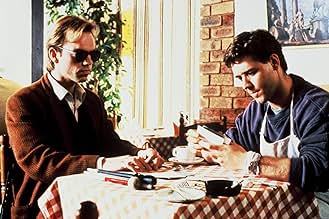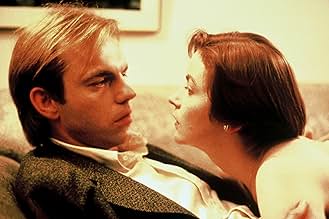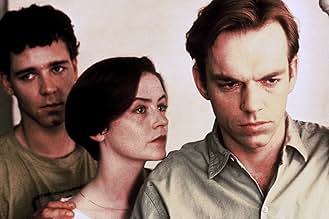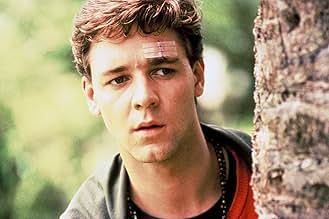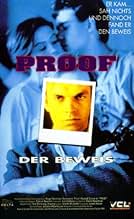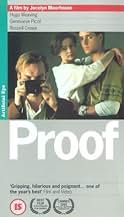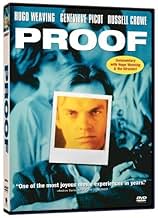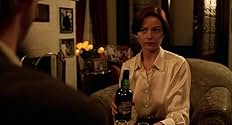IMDb RATING
7.2/10
7.3K
YOUR RATING
The life of a blind photographer who is looked after by a housekeeper is disrupted by the arrival of an agreeable restaurant worker.The life of a blind photographer who is looked after by a housekeeper is disrupted by the arrival of an agreeable restaurant worker.The life of a blind photographer who is looked after by a housekeeper is disrupted by the arrival of an agreeable restaurant worker.
- Awards
- 12 wins & 4 nominations
Geneviève Picot
- Celia
- (as Genevieve Picot)
- Director
- Writer
- All cast & crew
- Production, box office & more at IMDbPro
Storyline
Did you know
- TriviaBecause his character, Andy, and Hugo Weaving's character, Martin, are supposed to be best mates, Russell Crowe set out to become good mates with Weaving by trying to share common interests. He would soon discover the only common interest they have together is that they are both huge fans of Doctor Who (1963).
- GoofsThe first time Martin enters his house, he gets surprised by Celia sitting and making a noise. However, since she is smoking, he could have smelled the smoke as soon as he had opened the door. Later in the movie, he is suggested to have a pretty sensitive nose for a perfume a lady is wearing in the veterinarian's office.
- SoundtracksSymphony No. 5 in C Minor
(1809) (uncredited)
Written by Ludwig van Beethoven
First Movement played by the Melbourne Symphony Orchestra
Conducted by Nicholas Braithwaite
Featured review
This deliciously enticing bit of cinema from Down Under revolves around the activities of three people: A mistrustful blind man, a desperate, love-hungry woman, a misguided young man, and what happens when these three paths intersect.
Martin is a misanthropic blind man, whose unshakable mistrust of humanity compels him to compulsively take photographs of everything around him. So deeply-rooted is his paranoia that he believes his own mother rejected him because of his handicap, and so deceived him in her descriptions of the world. Martin took a picture--his first--of a garden his mother customarily described to him, as evidence that she had lied.
Martin's paranoia that anyone might be lying to him has shaped the rest of his life, growing up to become uncompromising and fiercely independent. He behaves callously in his only human interaction--with his rancorous housekeeper, Celia. Celia is obsessively, possessively in love with Martin. But their relationship is a prickly one, marked with cruelty and malice on both parts. Martin, aware of Celia's desire for him, uses the knowledge as a weapon--tormenting her by keeping her on, but rebuffing her attempts. In return, Celia spitefully rearranges the furniture so Martin will run into it and exploits his dependency on her to boost her own ego.
Years later, Martin is still a photographer, but now he wants someone he can trust to describe his first photo to him, thus giving him the 'proof' of a long-dead mother's love.
This someone happens to be Andy, a dishwasher at a local restaurant. But when Andy threatens to become too great an influence in Martin's life, Celia, feeling her territory has been violated, sets out to discredit Andy--using her sexuality to control both men.
"Proof" could all so easily have slipped into melodramatic theatrics, but the film skips nimbly along the line, managing to evade all potential traps. Most of the credit is due to the adroit, agile script and the outstanding performances from the cast.
Jocelyn Moorhouse, the film's director and writer, has the innate gift of comprehending, capturing, and conveying the human condition so aptly, so that the audience is deftly drawn into these characters' lives. The film doesn't rely on a contrived plot to induce interest; these ordinary characters are intrinsically fascinating simply because of who they are.
The acting is superb, making for a fabulous ensemble piece. Hugo Weaving renders a thoughtful performance as Martin, convincingly portraying a man who has closed himself off so effectively against the possibility that he might get hurt, that he has cut off the possibility of feeling. Genevieve Picot is likewise excellent, marvelously calculating, yet vulnerable as Celia. And Russel Crowe radiates an already unmistakable and irresistible charisma on-screen in this early role as Andy. His easy-going, honest, bloke-next-door charm is utterly appealing--a far cry from later roles in "L.A. Confidential" and "Gladiator", showing his incredible acting range.
This diabolically clever, enormously witty, and refreshingly original film can be hilariously funny at some times, genuinely heart-rending at others, and an all-round brilliant bit of cinema. Well-worth a look.
Martin is a misanthropic blind man, whose unshakable mistrust of humanity compels him to compulsively take photographs of everything around him. So deeply-rooted is his paranoia that he believes his own mother rejected him because of his handicap, and so deceived him in her descriptions of the world. Martin took a picture--his first--of a garden his mother customarily described to him, as evidence that she had lied.
Martin's paranoia that anyone might be lying to him has shaped the rest of his life, growing up to become uncompromising and fiercely independent. He behaves callously in his only human interaction--with his rancorous housekeeper, Celia. Celia is obsessively, possessively in love with Martin. But their relationship is a prickly one, marked with cruelty and malice on both parts. Martin, aware of Celia's desire for him, uses the knowledge as a weapon--tormenting her by keeping her on, but rebuffing her attempts. In return, Celia spitefully rearranges the furniture so Martin will run into it and exploits his dependency on her to boost her own ego.
Years later, Martin is still a photographer, but now he wants someone he can trust to describe his first photo to him, thus giving him the 'proof' of a long-dead mother's love.
This someone happens to be Andy, a dishwasher at a local restaurant. But when Andy threatens to become too great an influence in Martin's life, Celia, feeling her territory has been violated, sets out to discredit Andy--using her sexuality to control both men.
"Proof" could all so easily have slipped into melodramatic theatrics, but the film skips nimbly along the line, managing to evade all potential traps. Most of the credit is due to the adroit, agile script and the outstanding performances from the cast.
Jocelyn Moorhouse, the film's director and writer, has the innate gift of comprehending, capturing, and conveying the human condition so aptly, so that the audience is deftly drawn into these characters' lives. The film doesn't rely on a contrived plot to induce interest; these ordinary characters are intrinsically fascinating simply because of who they are.
The acting is superb, making for a fabulous ensemble piece. Hugo Weaving renders a thoughtful performance as Martin, convincingly portraying a man who has closed himself off so effectively against the possibility that he might get hurt, that he has cut off the possibility of feeling. Genevieve Picot is likewise excellent, marvelously calculating, yet vulnerable as Celia. And Russel Crowe radiates an already unmistakable and irresistible charisma on-screen in this early role as Andy. His easy-going, honest, bloke-next-door charm is utterly appealing--a far cry from later roles in "L.A. Confidential" and "Gladiator", showing his incredible acting range.
This diabolically clever, enormously witty, and refreshingly original film can be hilariously funny at some times, genuinely heart-rending at others, and an all-round brilliant bit of cinema. Well-worth a look.
- tintinnabulationess
- Oct 11, 2002
- Permalink
- How long is Proof?Powered by Alexa
Details
Box office
- Gross US & Canada
- $524,668
- Gross worldwide
- $524,895
- Runtime1 hour 26 minutes
- Color
- Aspect ratio
- 1.85 : 1
Contribute to this page
Suggest an edit or add missing content




